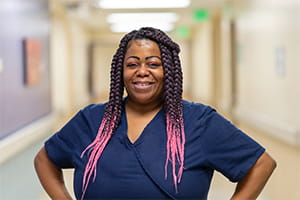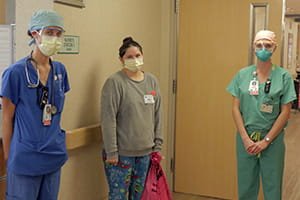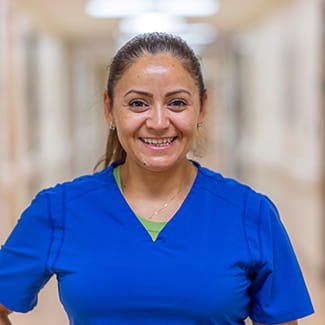Real Stories of the Frontline Workers of Denver Health
November 12, 2020
Why These Heroes Still Love Their Jobs Through the COVID-19 Pandemic
Ask any of our amazing frontline workers at Denver Health – from the housekeepers and food service workers, to the doctors, nurses, techs and more – and they will tell you they know the COVID-19 pandemic is far from over. While some members of the community are getting "fatigued" with the restrictions to stop its spread – such as mask-wearing, social distancing of six feet or more and limits on the number of people at gatherings – the heroic frontline workers know first-hand what it's like to deal with the virus. They agree that with vaccines still in development and testing, we are just months into a marathon (not a sprint) in the fight to defeat this virus.
Our frontline workers have heard and seen the inspiring patient recovery stories and experienced the tragedies of those who didn’t make it.
And they have stories of their own. Stories of the fears they have had facing the virus and coming to work, stories of what they’ve had to sacrifice to help others. Yet through it all, they are united by this – a love of their jobs and their call and commitment to duty, a call they pledge to continue to answer, even in face of what is certainly the toughest challenge of their careers.
These are their stories.
Starting Oct. 22, and continuing for four weeks, we will add a new video each week, honoring a variety of frontline workers from throughout the hospital. You can also see their stories told through images with quotes further down here on this page.
We hope by telling their stories they inspire you with their commitment to care — and showcase how a community can come together through the sacrifice of others.
Denver Health's Frontline Heroes: In Their Own Words
The early days of the COVID-19 pandemic were the toughest for all of our frontline heroes, because so much was unknown. Many of our health care workers reflected on how far they've come and what they've given up, personally and professionally.
"There's a lot of sacrifice that we don't like to talk about because we don't want to diminish the stressors that our patients are going through," said labor and delivery nurse Emily Moats, RN, "but it has been a stressful time to be a nurse for sure. There is a stigma around working in a hospital with people knowing you're a nurse and they're less likely to want to see you because they know you're more exposed to the virus."
"Our COVID patients are in very, very huge amounts of pain and distress and they get zero visitors," speech language pathologist Thomas De Miniac reflected. "We help patients who haven't been able to communicate vocally for weeks."
"The early days were pretty scary," said COVID unit nurse Alexandra Yates, RN. "I was in Arizona when the pandemic first started happening and I was at a concert and it was probably the last concert before everything got shut down."
"A significant fear and anxiety on the part of all physicians right now is knowing that we can do our jobs and provide the care that we want to provide and not being able to take care of people the way we want to, or perhaps have to see people suffer and die because of it," said emergency department physician Molly Thiessen, MD. "That's keeping me up at night."
"As a father, it's been really hard to watch my kids lose school and all of their usual activities," said emergency department physician Jeffrey Sankoff, MD. "As a husband, it's been difficult to watch my wife have to lose the things that she loves, and even with her work, she's a surgeon and was not able to practice in the way that she usually does. But then as a physician myself, it's been particularly difficult, because it's hard to come to work and realize the patients are dying and patients are being exposed to something that is new and difficult for us to deal with as physicians."
"Initially what scared me the most was for my wife, my loved ones, and my family, getting it from me, essentially getting it and passing it on to others," said Denver Health correctional care nurse Matthew, RN.

Hospital Cleaning Staff Talk About Working During COVID-19
On the non-medical side, some of our housekeeping staff shared those concerns about working in an environment so close to patients with this virus.
"I was really concerned at first of bringing the virus home to my family, being concerned about it being on my clothes and then coming home and hugging my grandkids and my kids," said environmental services (EVS) worker Venus Weddington. Weddington cleans, disinfects and sanitizes patient rooms in the emergency department.
"When COVID started I was very nervous and scared for my family," said Diana Correa Hernandez, who cleans patient rooms in the Medical Intensive Care Unit.
"It was very stressful in the beginning because we were all new to what was going on," EVS worker Karol Galdamez agreed. "But as the days went by, I felt more confident knowing we were safe and I was doing important work."
Why Health Care Workers Still Love Their Jobs
All the frontline workers said that as time passed, they began to feel more comfortable.
"I kept coming back because of my patients," said mom and baby nurse Zenyace "Zen" Carrillo, RN. "I like taking care of moms and babies, and I give them the same treatment whether they are COVID positive or not."
"The one thing that really pulled me out of the depths of despair and fear and anxiety was the community support surrounding health care workers and the thank-you notes written by patients and friends," said Dr. Thiessen.
Peggy Christian, a certified nursing assistant on the COVID unit, is one of many health care workers who came down with COVID and is now back to work after recovery. She uses her experience to connect to her patients and give them hope. "I love working in the COVID area because that gives me the opportunity to tell my patients, 'Okay, I had it and I made it, so you can make it, too.'"
Yates talked about "tunnels" that the nurses and providers make for COVID patients who have been intubated and – as she put it – "gone through the ringer" and then have recovered and are getting discharged. The patients walk through as all of their caregivers applaud for them. "That is one of the coolest things to experience."

Sometimes it's the little things that stick out the most. As Fonken put it, "I had a patient who was on a ventilator for over a month and I found out that all he wanted when he got off the ventilator was a grape Powerade... and when he did get off the ventilator, I got him his grape Powerade. It's the small things like that make the biggest difference."
"Through this whole emergency I have not heard an emergency physician or emergency nurse or an emergency tech or a paramedic say, 'I'm not going to come to work because I'm afraid of COVID,'" said emergency physician Eric Lavonas, MD. "I love my job and I'll always keep coming to work. We are experts in the care of critically ill and injured people. If we weren't here, there'd be nobody for these patients.
“We’re going to keep coming to work and we'll always be here for you."
Finally, Matthew from correctional care echoed so many others' feelings: "I love what I do. I chose this profession because I wanted to be on the front line doing this, and there's nothing else I wanna do."
Manage Your Healthcare From Anywhere, At Any Time
Create a New Account
Existing MyChart Account



